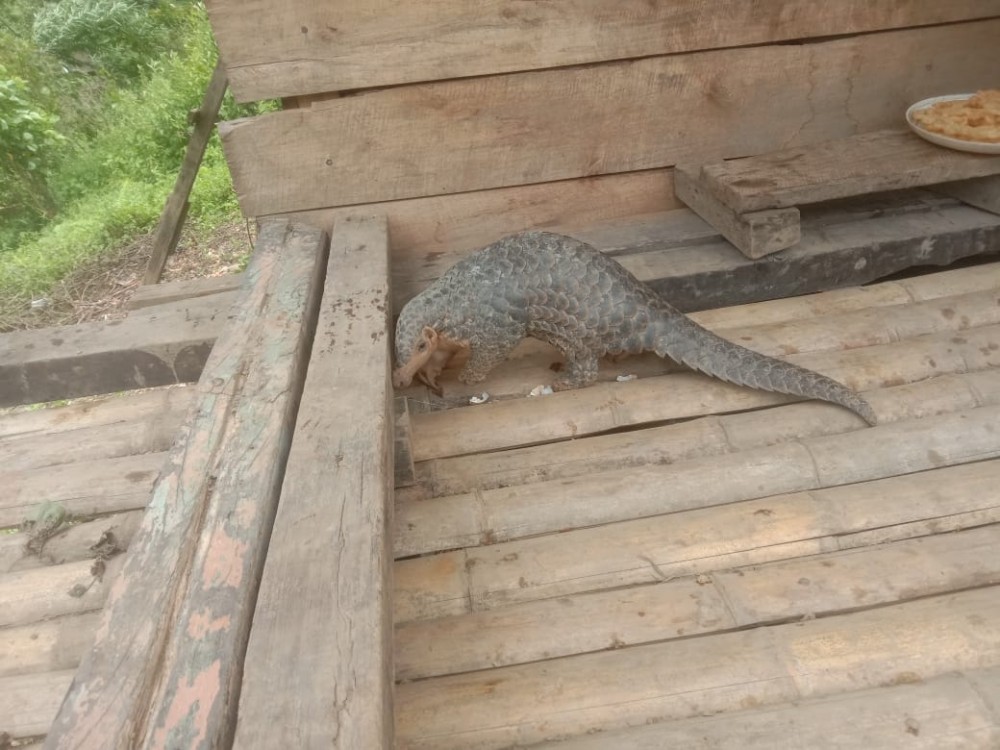The Chinese pangolin, which was recently caught by the farming community of Thokihimi village and released into its natural habitat.

Rescued pangolin released into its natural habitat with joint efforts of communities in Zunheboto
Vishü Rita Krocha
Kohima | August 2
The village communities of Thokihimi village under Tokiye Block in Zunheboto district were once voracious hunters. There was a time when the sight of a pangolin or any other wildlife would only mean one thing- ‘a good hunt’.
However, this perception about wildlife has evolved over the years with concerted efforts from different individuals and organisations, who are determined to pass on the message of biodiversity conservation.
On the evening of August 1, a pangolin was caught by the farming community of Thokihimi village while constructing an irrigation channel supported by the various initiatives undertaken by the IFAD-FOCUS.
On August 2, the community had gathered together for a brief interaction with the District Management Unit of Zunheboto under FOCUS.
Following this, the endangered species of pangolin was released unharmed into its natural habitat with the joint efforts of FOCUS DMU Zunheboto, leaders and the farming community of Thokihimi village.
The Chinese pangolin, scientifically known as Manis pentadactyla is native to the Northern Indian Subcontinent, Northern parts of Southeast Asia and Southern China and has been listed as Critically Endangered on the IUCN Red List since 2014. It has also been estimated that the wild population has declined by more than 80% in three pangolin generations.
The International Union for Conservation of Nature (IUCN) Red List of Threatened Species was founded in 1964 as an inventory of the global conservation status and extinction risk of biological species.
As of 2023, it is reported that of 150,388 species surveyed, 42,108 are considered at risk of extinction because of human activity. Pangolins are also reportedly poached mainly for international markets for their scales, which is believed to have high medicinal value.
Speaking to The Morung Express, Dr Auto Yeputho, FOCUS District Project Officer, Zunheboto highlighted that in the past, pangolins were mostly caught for consumption by the indigenous hunters because they were also not aware of the need to conserve biodiversity or that it was is an endangered species.
The International Fund for Agricultural Development (IFAD)-funded FOCUS Project, he said, “alongside agricultural practices, we have also been empowering farmers on the importance of conserving our biodiversity and they are a lot more conscious about biodiversity conservation now.”
Citing a similar instance wherein a pangolin was released a month ago by FOCUS’ Farmers Interest Group (FIG) along with the village community in Tsutoho village under Zunheboto district, he noted:“ The sense of responsibility about conservation is progressively noticeable amongst the youths and the farming community.”
“FOCUS, with a good rural village coverage has given a good platform in creating awareness and encouragement to farmers in giving equal importance to ecology and biodiversity conservation besides various agricultural practices,” he added.
Mention may be made here that FOCUS (Fostering Climate Resilient Upland Farming Systems in the Northeast) covers 645 villages across 9 districts of Nagaland.
Through various gatherings of the farming community, he said the villagers are made aware not only of the agricultural practices but also about strengthening ecotourism, Agri and Agro tourism.
In this regard, he also pointed to other rare wild flowers like orchids or even wild fruits that are found only in the area and emphasised on their preservation.
While encouraging farmers to pursue this kind of conservative works alongside agriculture, he said the farmers are also inspiring one another by sharing videos of pangolins being rescued.
“Once a voracious hunter, they are now becoming a voice and agent of biodiversity conservation,” he further remarked.






